Melatonin often gets tagged solely as the ‘sleep hormone’, but let me tell ya, there’s more to this little chemical superstar than meets the eye. It’s like calling the internet just a tool for emails. In reality, melatonin wears many hats, and its possible link to hair health is intriguing.
So, what’s the deal with melatonin and hair? Some folks claim this hormone can mess with your mane, while others insist it might actually help your hair become your crowning glory. Yep, it’s one of those ‘does it or doesn’t it’ mysteries that circle the beauty and health world.
Now, as your guide on this hairy adventure, I’m setting out to help you cut through the noise and get to the meat of the matter. We’re gonna see if melatonin messes with our locks in any good or bad ways. Does it have a secret side job in our hair care routine? Or are we just getting tangled up in rumors?
🌙 Melatonin Unpacked: The Science Behind the Sleep Hormone
Melatonin is this cool hormone that your pineal gland cranks out when it’s lights out. Think of it as your body’s own bedtime signal, like a gentle tap on the shoulder saying, “Hey, it’s snooze time!” It’s like nature’s own transition into the dream world, helping regulate our sleep-wake cycles.
But melatonin isn’t a one-trick pony just hanging out in the sleep section. It’s got its fingers in a few other pies too. Turns out, it can play a role in stuff like immune function, maybe even tinnitus relief, and get this — it might be involved with hair growth!
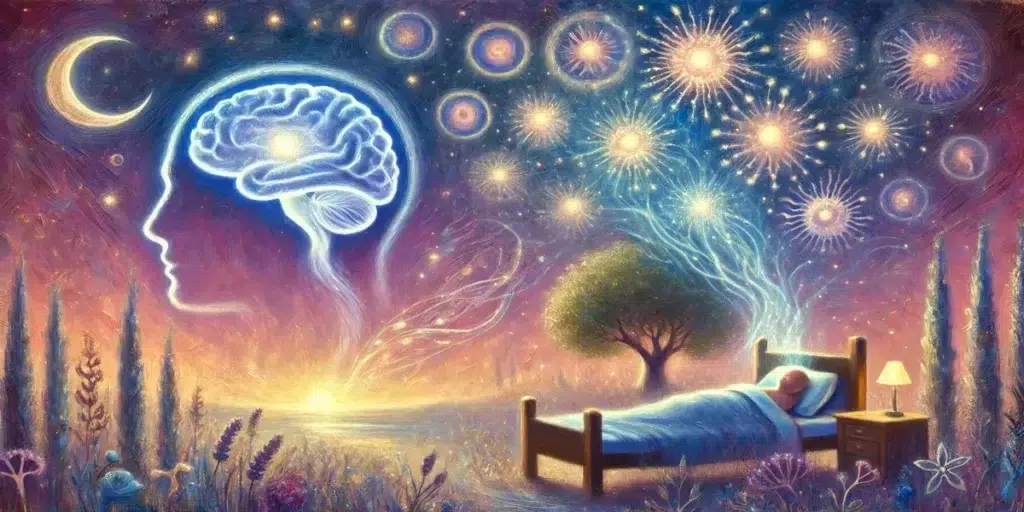
So how does this night owl hormone work its way into the hair growth story? Science tells us that those hair follicles you might obsess over — are sensitive to it! No joke. Melatonin doesn’t just clock in for its night shift either. By day, it might interact with these follicles to help keep the hair cycle running smoothly.
The big question: how does melatonin do that? Well, it all boils down to its antioxidant properties. It’s kind of like a bodyguard for your strands, protecting them from damage and potentially boosting the cycle that gives us hair’s growth, rest, and shed periods. So while it moonlights as a sleep aid, it’s quite busy doing a tour of duty for our hair too.
💃 The Intricate Dance: Melatonin and Hair Growth
We all want to understand what makes our hair tick, right? Well, it turns out that the hair growth cycle is a bit like a well-rehearsed dance. You’ve got the anagen (growth phase), the catagen (transition phase), and then the telogen (resting phase) stepping in to complete the routine. But where does melatonin fit into this picture?
Melatonin might not lead the dance, but it still plays a solid backup role. Scientific studies suggest it could influence how long your hair stays in those crucial growth stages. In simpler terms, longer growth stages generally mean more hair on your head. What’s not to love about that?
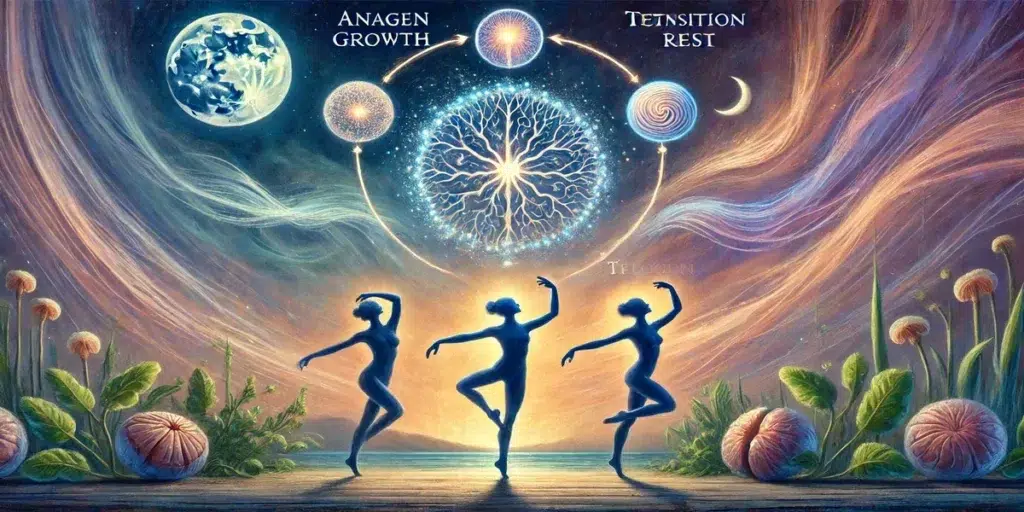
The cool thing is that hair follicles actually have their own internal melatonin gear. This local production means they’re super responsive to changes in melatonin levels. During those peaceful night periods when melatonin is naturally higher, your hair follicles might get a little extra juice to boost growth. It’s like giving your car a premium fuel boost overnight.
Of course, melatonin isn’t working alone here. Other factors — like chronic stress, poor nutrition, harsh shampoos full of sulfates, or skipping conditioner altogether — can throw off your scalp’s balance. It’s like expecting a great dance while the music’s off-beat. Supporting your hair growth means looking at the whole rhythm: restful sleep, gentle hair products, balanced meals rich in hair-friendly nutrients, and keeping stress levels in check.
Let’s not get carried away, though. Research is still piecing everything together about melatonin’s role in this cycle. Some studies float the idea of potential benefits, while others call for more proof. So it’s clear there’s still a lot to learn about how this nighttime hormone impacts our daytime hair ambitions
🔍 Busting Myths and Revelations: Sorting Facts from Fabrications
Hair and hormones can be a tricky combo, and when it comes to melatonin, there are a few tall tales floating around. Ever heard that melatonin causes hair loss? Well, let’s set the record straight—it’s a myth! There’s no solid evidence backing up this claim. Melatonin’s role doesn’t include being a saboteur of your strands. If anything, it’s being studied for potential benefits, not drawbacks.
Switching gears, let’s look at the buzz around topical melatonin. Can a cream or serum really help your hair grow faster than a weed in summer? The science so far suggests there might be something to it. Some research points to topical melatonin being a cool ally for hair density and improving the hair’s infamous growth cycle we’ve talked about. But we need to see more studies with larger groups before we all jump on the bandwagon.
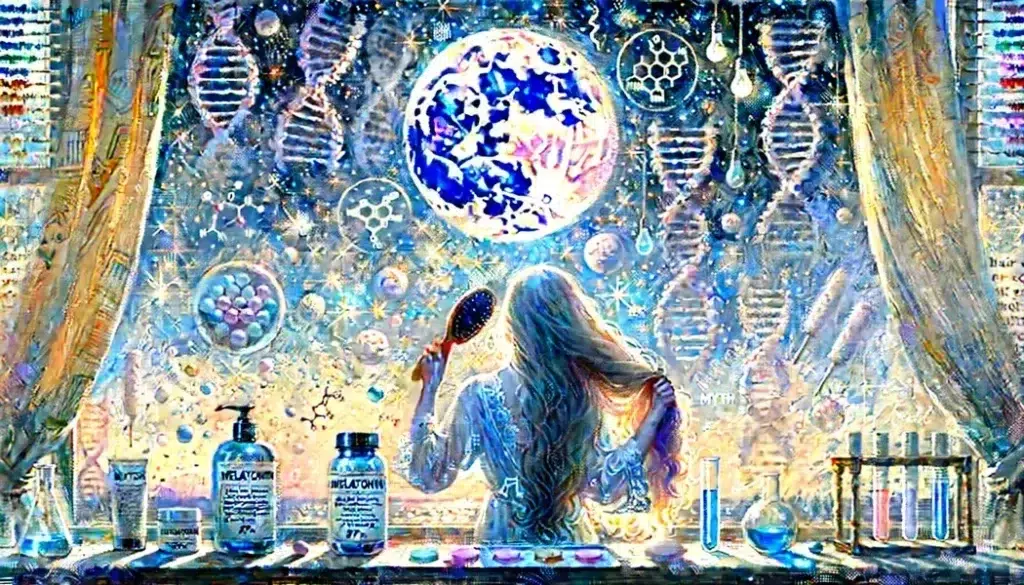
Now, just because a product has ‘melatonin’ slapped on the label doesn’t mean it’s your hair’s new best pal. The cosmetics market loves a good trend, and melatonin’s no exception. Always do your homework, check the ingredients, and see if there’s science-backed evidence behind the hype before you make a purchase.
Remember, not all hair loss and growth issues are created equal. Personal factors like genetics, health, and even stress levels play a big part in the way your hair behaves. That’s why a holistic approach matters — incorporating sleep, nutrition, hair-friendly shampoos and conditioners, and stress-reduction habits into your routine.
🧴 Evaluating Melatonin Products: Gimmick or Genuine?
With melatonin’s entrance into the hair game, the shelves are stacked with supplements and creams claiming magic bullet status. Before dropping dollars, here’s a quick guide to navigating this maze.
First off, melatonin supplements are more about getting your sleep on, not directly about growing that luscious mane. Sure, better sleep can indirectly benefit hair health, but taking melatonin won’t automatically transform your locks.
Topical melatonin, like serums or creams—the storyline is a bit different here. These products have been gaining buzz for possibly boosting hair density. Some users share glowing reviews about feeling thicker hair. However, it’s still a good idea to approach with a little caution. Check the research behind it, see how the product blends melatonin with other hair-friendly ingredients, and ensure it’s not inflating claims.
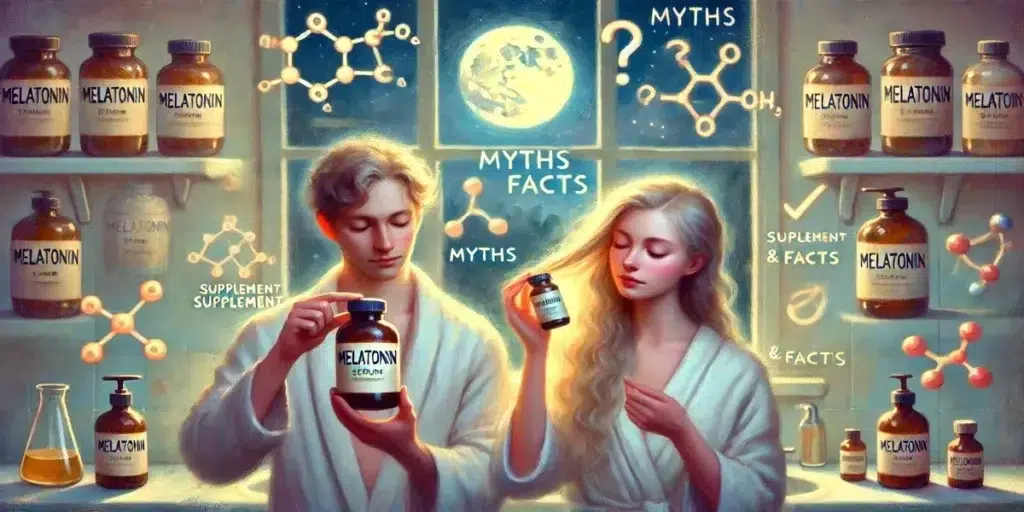
And while you’re reviewing products, think about the bigger picture. Are you using a gentle, sulfate-free shampoo? Are you following up with a hydrating conditioner that actually nourishes your scalp? Are you eating nutrient-rich foods that support hair growth from the inside out? And let’s not forget the sneaky role stress plays in sabotaging even the best routines.
What’s important here is setting realistic expectations. Brands love to market the next big thing, but hair growth is a gradual process determined by a lot more than just one product. Melatonin could be a helpful addition to a well-rounded haircare routine, but it’s not gonna act alone.
In the end, many variables affect hair health. From diet and stress to sleep and scalp care, it’s all connected. That’s why a holistic approach is your best bet: one that blends smart products with good habits and thoughtful choices.
Stay with us — the best is yet to come.
By following our advice, you’re doing the most you can for your hair.
Be the first to know when we publish new guides, tests, and proven strategies for stronger, healthier hair.
👉 Visit the About Me page to learn more about my journey, mission, and why helping people with hair health is so personal to me.
Want healthier, stronger hair? Discover 8 science-backed habits that protect your scalp and boost natural growth. Get your free PDF guide today!
Disclaimer: This article is for informational purposes only and is not a substitute for professional medical advice. Sensitive claims are supported with scientific references, and full product details can always be found on the official websites of the respective manufacturers or distributors.
Some links in this article are affiliate links. If you choose to make a purchase through them, I may earn a small commission at no extra cost to you — helping me keep HairGrowGenius running. Thank you for your support!

✅ FAQ – Melatonin and Hair Loss: Separating Fact from Fiction
❓ Can melatonin help regrow hair in people with androgenetic alopecia?
Although melatonin is not a first-line treatment for androgenetic alopecia, some topical formulations have shown promise in reducing hair thinning and promoting regrowth by acting as an antioxidant and modulating hormonal signals. However, results vary, and more large-scale human studies are needed.
❓ Is oral melatonin better than topical melatonin for hair health?
Topical melatonin appears to be more effective for targeting the scalp directly. Oral melatonin affects the entire body’s circadian rhythm and may have indirect effects on hair, but topical use delivers antioxidants and hormonal signals directly to hair follicles where they’re most needed.
❓ Can melatonin cause hair loss in some individuals?
While melatonin is generally considered safe, in rare cases, people may experience hormonal shifts or sensitivity that could influence hair cycles negatively. This is not common, and most people tolerate melatonin well without any noticeable hair-related side effects.
❓ Does melatonin interact with other hair loss treatments like finasteride or minoxidil?
There are no known harmful interactions between melatonin and FDA-approved hair loss treatments like finasteride or minoxidil. In fact, melatonin may complement these treatments by reducing scalp inflammation and oxidative stress, but always consult your doctor before combining therapies.
🧾 Last updated: June 2025 based on latest research.

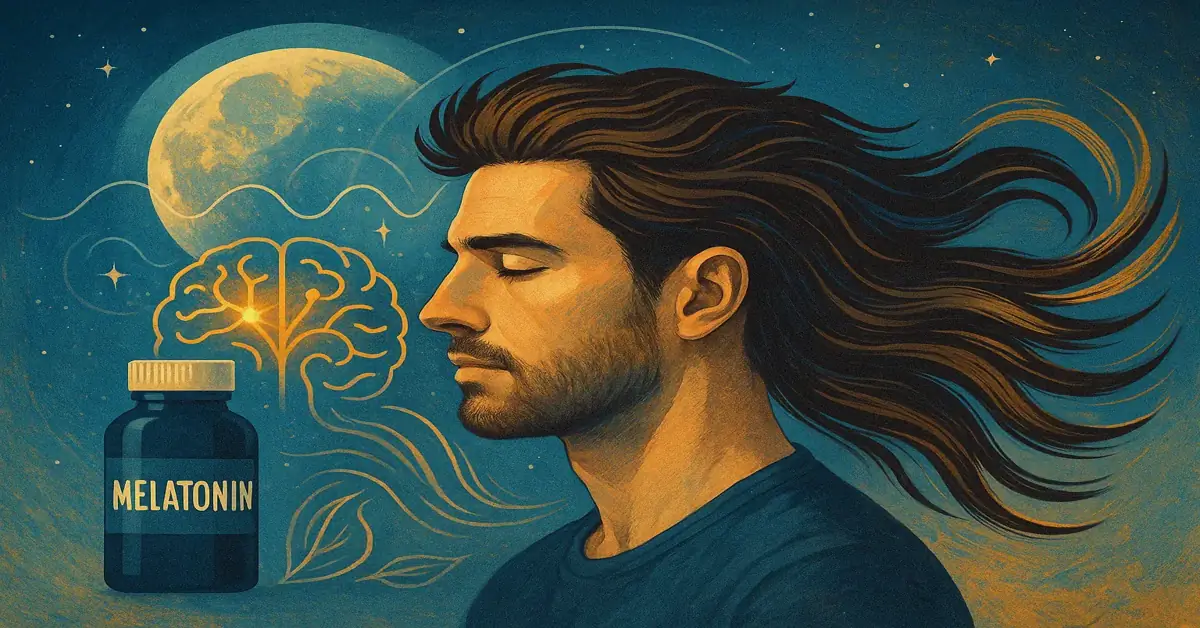
Leave a Reply